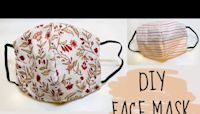Search results
- Interesting finds
Nov 4, 2023 · Yes. When used with measures such as getting vaccinated, hand-washing and physical distancing, wearing a face mask slows how quickly the virus that causes COVID-19 spreads. The U.S. Centers for Disease Control and Prevention (CDC) recommends wearing masks if you choose to, and in specific places and situations.
Do I need to wear a face mask if I currently have COVID-19? Yes. If you are actively infected with the coronavirus and cannot stay completely away from others in your home, droplets from your nose or mouth could infect another person.
Jan 23, 2024 · Face masks can prevent or limit airborne transmission of COVID-19, as they create physical barriers against exhaled, virus-laden respiratory droplets. Masks can also protect uninfected wearers...
Jan 14, 2022 · (404) 639-3286. CDC has updated our consumer webpage describing the types of masks and respirators used to prevent the transmission of SARS-CoV-2. Masking is a critical public health tool to prevent the spread of COVID-19, and it is important to remember that any mask is better than no mask.
Nov 30, 2023 · Face masks won't totally block COVID, but some, like the N95, come very close. A mask gives an added layer of protection to you and the people around you. Certain types of masks offer more...
Jan 14, 2022 · Fact checked by Nick Blackmer. Print. Verywell / Alex Dos Diaz. Key Takeaways. Experts say cloth masks may not offer enough protection amid the Omicron surge. Compared to cloth and surgical masks, the N95 respirator offers the most protection against COVID-19.
Jan 28, 2022 · 617. By Tara Parker-Pope. Published Jan. 14, 2022 Updated Jan. 28, 2022. Leer en español. The fast-spread of the infectious Omicron variant has prompted many people to try to upgrade to a...










